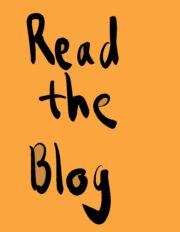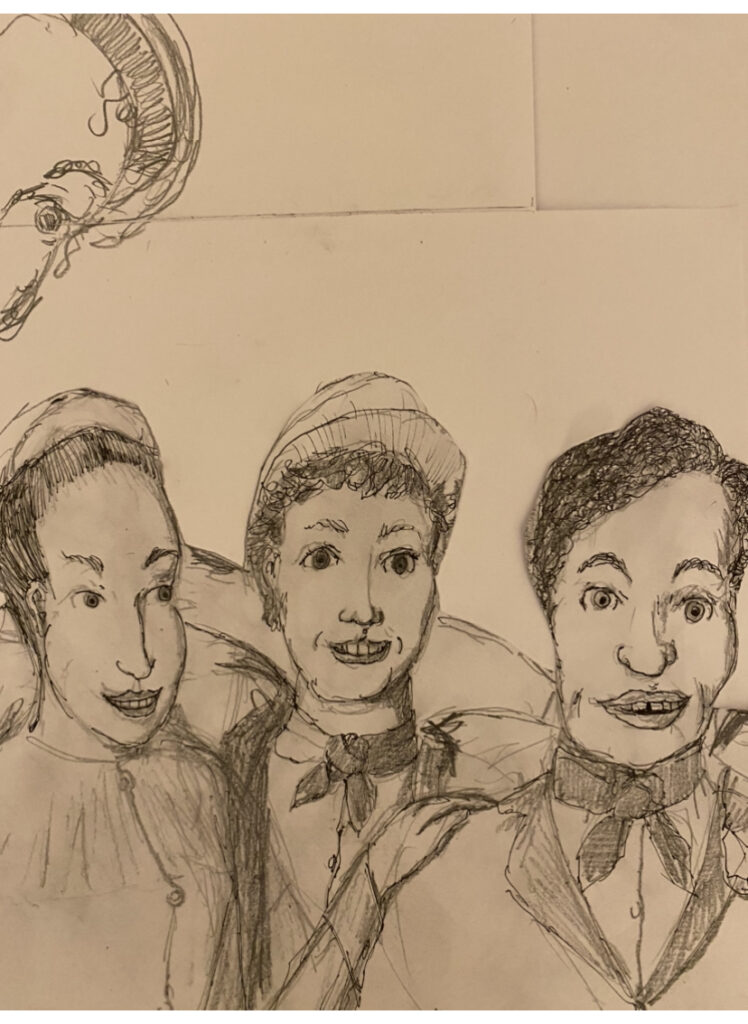
“Where are we going boys?”
“To the top, Johnny!”
“What top is that boys?”
“The toppermost of the poppermost, Johnny!”
“That’s right so let’s give it some. One, two, ah one two, three…”
A. The general premise: Freedom House is an organisation that cares for the WILY URCHINS, the street children of the CITY. This is a real charity in their fictional VICTORIAN WORLD. They do provide shelter, education and help with employment to the city’s many street children. However, it is also a front for another central activity: finding, freeing, and otherwise helping LOST SOULS to depart to the OTHER SIDE. They do this whenever they receive a CALL, almost always in the form of a DREAM, dreamt by ALBERT, witnessed by GEORGIA and INTERPRETED by MR GRAND. The story is told in BOOKS, with a resolution of the A STORY and a continuing arc for the C STORIES.
B. SCRIPT, PANELS AND PAGES: Each book must be scripted with a 4-Act structure. Act I, THE CALL inciting incident (usually in the form of a DREAM) of the A Story, plus set up the other stories as much as possible in the space of 7-9 pages
ACT I should climax with the DREAM and have an after-climax scene where THOMAS GRAND uses clues from the dream to figure out where to go and what COVER STORY to use.
Act II, FOLLOWING CLUES AND STORY B COMPLICATIONS – the GANG follow clues and unlock the mystery of who the ghost is, whether they are LOST, TRAPPED, BOUND, or UNWILLING as the B STORY complicates things. ACT II climaxes somewhere around page 18 or 19 when all seems lost, they’ve wrecked it.
ACT III CRISIS AND RESOLUTION. Someone in the GANG, usually GEORGIA, will have an idea that might work, but stakes for failure are high…and somehow the twists and turns come right. ACT III climaxes with the GHOST travelling to the OTHER SIDE and their loved ones ready to carry on, with a hint that they will heal. Some APPROPRIATE PRIZE is won, which the GANG will give to the URCHINS. Occasionally, a NEW MEMBER OF THE GANG can be identified and recruited.
ACT IV is the denoument where the GANG return to headquarters with a treat they won for the WILY URCHINS, who take it and use it in some quirky, surprising way.
Panels: each PANEL must be drawn with a new perspective to keep visual interest. Think of a new panel as a new camera angle in a film. If you don’t want a new angle, no need for a new panel.
Pages: each PAGE must start with an orienting PANEL so the reader knows where we are and who’s here. Each PAGE must have its own little story with a punch in the final panel. Each page should have about 5 PANELS. There can be 1-3 SPLASHES. A SPLASH is a page with just one big panel, usually for extra-focused artistic or poetic effect.
COLOUR/BLACK AND WHTE each panel for print should be drawn first as a line drawing, using hatching etc for shading, but avoiding greyscale as far as possible to keep costs down. Cover – front/back/inside/outside will be in full colour, with the back outside cover being story-ending with the URCHINS.
REQUIRED STORY ELEMENTS for each 24 page comic:
A STORY: SOLVE THE MYSTERY to FIND AND FREE THE LOST SOUL – the GANG, bound by LOVE for each other and a commitment to freedom and human dignity, each using their particular STRENGTH but also displaying their FLAW, will solve a ghost mystery, help a lost, trapped or unwilling soul to depart to the OTHER SIDE. This may be tender – GEORGIA sings a child who died down the mine to sleep, assuring them that nothing can hurt them now, and there’s nothing more they can do to help their mates. “You mean I can just…rest?” “Yes.” They can be dramatic or even a bit tragic (but see TONE), but never comedic. Funny moments okay but the story-line itself can’t be funny. The A STORY provides the dramatic plotline on which to hang:
B STORY – THE GANG travel incognito, under assumed identities and purposes. THOMAS GRAND usually has the idea for their COVER STORY, and assigns roles to be played by each member of the GANG but this always backfires in some way, usually by attracting unwanted attention. This should be lighthearted and ideally funny. Example, in Ghost Rider they travel as a prize-fighter, played by the mighty ALBERT, with the others as his promoter and servants, out in the countryside so he can train in the pure air and open space. This is ostensibly to explain strange activities as strength training, snooping about as training runs, etc. But this backfires as a local tough wants a sparring bout and won’t take no for an answer. Other circumstances mean that a public boxing match will create a diversion to give GEORGIA and JACK the chance to perform a mission unobserved. But THOMAS will only fight when it’s time to SMITE, so he has to lose the fight in some silly way…I don’t quite have it yet, but there needs to be a funny twist.
C STORY – this is in some ways the story-heart of each book. Each C STORY will involve the GANG and their relationships, dreams, hopes and feelings. The tone may be dramatic – GEORGIA lets down JACK after he proposes, telling him with tears in her eyes because she hates causing him pain that she’ll never be a wife. He accepts this and swallows the hurt because he LOVEs GEORGIA truly and will be her faithful friend no matter what. This is tested when he mistakes the intimate, but platonic, relationship she develops with a troubled young man for her being romantically interested in him, he feels betrayed and flounces out temporarily, to come back later like Han Solo at the end of STAR WARS. All is mended when he realises that GEORGIA did not lie about never becoming any man’s wife, and further deepened when JACK accepts that he doesn’t own GEORGIA, and that LOVE means wanting your loved ones to be happy. C STORIES can be funny, touching, cringey… just not dark or nasty in any way.
D STORY – The other stories end by providing some sort of gift or treat for the URCHINS, who are delighted with it, but take it in a wily direction. Alternatively, there is a problem the GANG must solve on their behalf.
CALL, DREAM and DREAM MICE – each book will have an Act I setup where ALBERT falls asleep, having eaten CHEESE. There is a waiting period, while the cheese is digested to the point of attracting the DREAM MICE. The DREAM MICE appear in surprising ways, sing a song and do a dance, then stage the dream. They are all dressed in black, like stage-hands and technical theatre/movie staff. After their song to the cheese (they are enraptured by its smell), they work like a machine to realise the dream. The DREAM should have surreal elements, sparked by the situation in reality. For example, in BOOK I, ALBERT dreams he is in a bosun’s chair anchored to the moon, about to do a cosmic swing, because the setting is on scaffolding atop a tall industrial chimney. DREAM MICE can be as anachronistic as you like, parachuting in or using SCUBA or anything you want.
MAIN CHARACTERS
GEORGIA STARRY – The GOVERNESS at FREEDOM HOUSE. AND HENRI, GEORGIA’S MOTHER.
GEORGIA cares for the URCHINS, teaching, feeding, making them have a wash, etc. They love her stories, hate her cooking. GIFT: she can enter and take part in (but this is dangerous) the dreams of anyone who has eaten cheese at bedtime. FLAW – can be seized by fear and go into panic mode. When this happens the WRITER/ARTIST may appear and give her encouragement, usually just reminding her she’s courageous. GEORGIA is also comforted and encouraged by her mother, HENRI who is an underground woman painter, who pays the rent by copying old masters. B stories might include selling her work, and others pushing her to do more originals, as she’s a master in her own right. HENRI managed to raise GEORGIA and teach her to read under enormous pressures of poverty and social struggle. HENRI offers wisdom and advice to GEORGIA but never stands in her way.
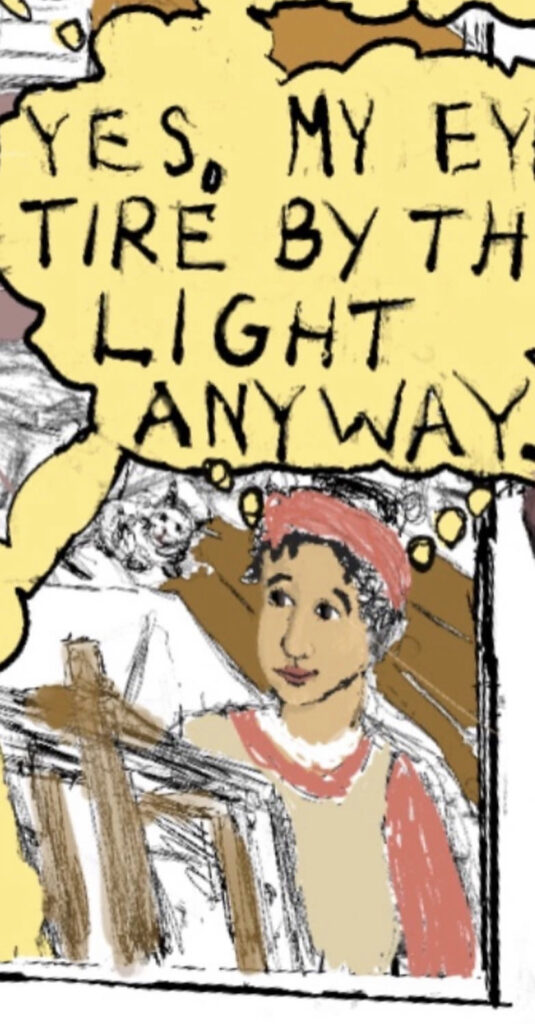
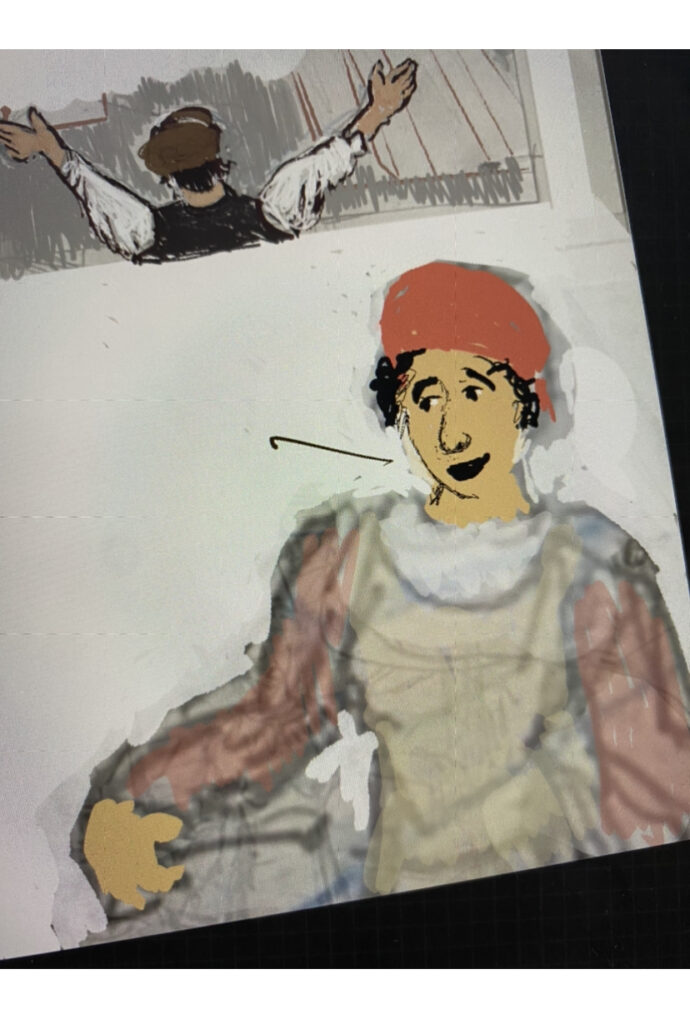
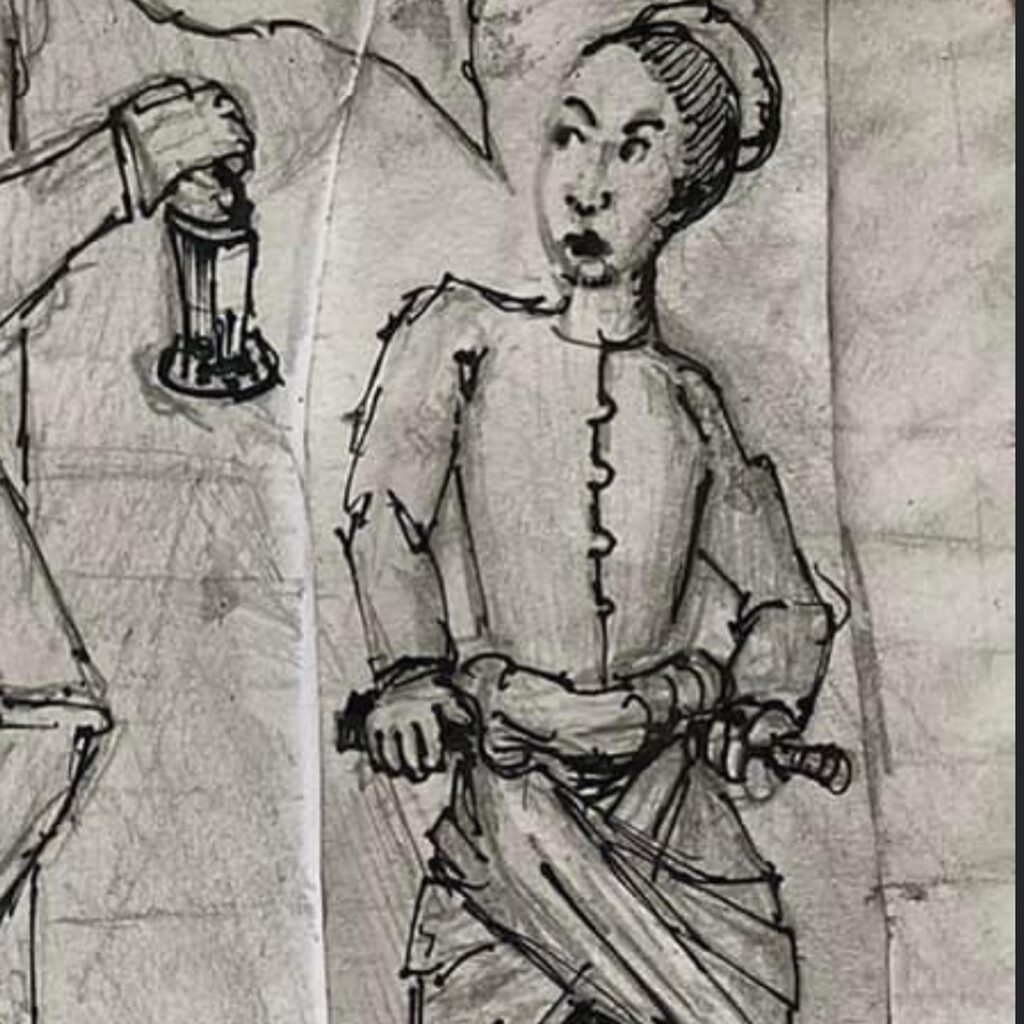
JACK FLEET GENERAL BUILDER AND HANDYMAN for FREEDOM HOUSE AND ALBERT THE EX-PRIZEFIGHTER STEEPLEJACK
JACK, apprentice steeplejack to ALBERT, an alum of the urchin’s academy there being an orphan handed in on their steps. The URCHINS all look up to JACK like he’s a god. STRENGTHS: courageous, kind, honest, and an unmatched builder/engineer. FLAW: always hung up on some girl who’s not interested, and oblivious to the affections other girls show. He’s not unkind, just clueless. FLAW: can flounce or sulk when his emotions take over. ALBERT rarely sleeps. When he does, and he’s had cheese, it means there’s a CALL. Strengths: skilled in all manner of building work, strong as four or five elephants and can SMITE those who deserve it. Not sure whether any SMITINGS ever actually happen on the page, as the look of him when he puts up his fists will terrify
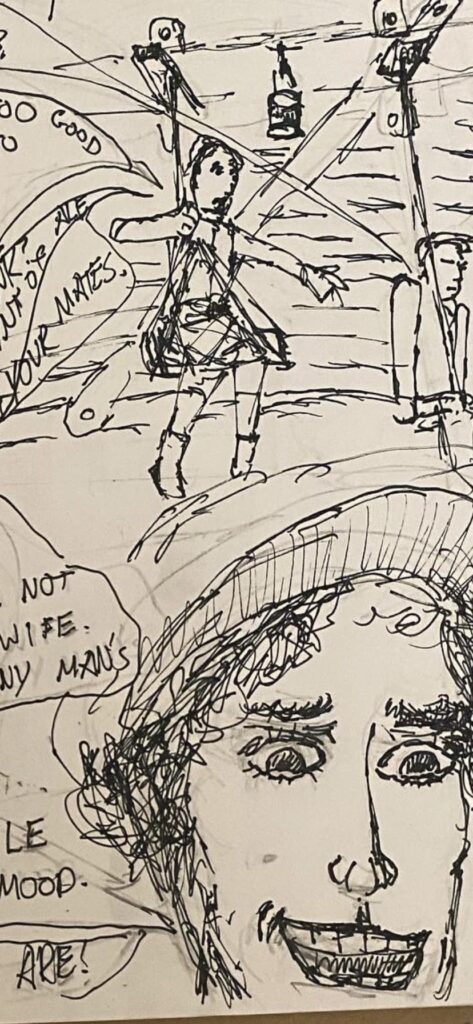
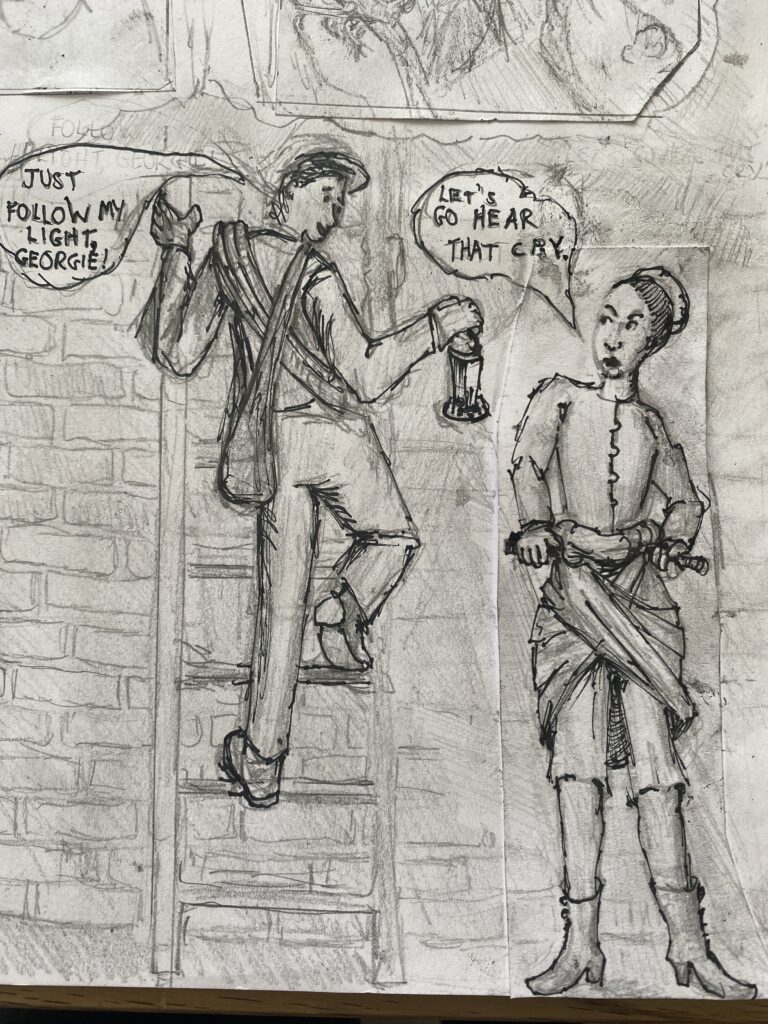
Georgia and Jack will always be at the centre of the A story action – true partners for sure. They have each others’ back, no they have each other’s 360 degrees, never a question unless Georgia freaks or Jack sulks but only one or the other at a time, the other will be strong, they pick each other up in every way.
THOMAS GRAND, patron of FREEDOM HOUSE. SCHOLAR, ACTOR AND VISIONARY OF A BETTER WORLD. STRENGTHS: Adopted as a child by a generous but emotionally distant benefactor, THOMAS is highly educated and a resourceful scholar. His inheritance is the main funding for FREEDOM HOUSE’s activities. He uses geology, history, cartography and many other academic disciplines to help solve the mysteries, starting from clues in the DREAM and going from there. He also inspires the others with a sense of mission. “History set the stage, but we each choose how we play the role we’ve been given.” The idea being we have to live in this world, but within its parameters we can choose to be good, ie promote human dignity. He walks his talk by caring for and nurturing the wily URCHINS. Does his best to encourage their wiliness towards good places. Unlike the other characters, who look European or mixed, THOMAS is Black, which means he is forced to battle racism, which has largely frustrated his ambition to be an actor in Victorian England. With GRAND as leader, the rest of the GANG are aware of racism and its devastating harms – “But we know where the cotton comes from” they might say for example when Jack talks about how much money can be earned as a steeplejack for the mills. THOMAS’ FLAW: his ambition to be an actor can lead him to overplay his role in the cover-story. He then has to figure out how to fix the B-STORY backfire as he beats himself up for being vain (his other FLAW-too self-critical).
WILY URCHINS: slightly wild and scheming street kids. They are often to be found dividing up something good or having a cookout, playing pranks on deserving adults, buying, selling, …just something always vaguely dodgy (but they’re kids) going on. Mad games of floor’s lava (some old sounding equivalent). When there’s a reward of some sort at the end of the mystery, this is handed over to the Urchins to make money out of or use in some way, but this should have some little wily twist. At the end of Ghost Rider, for example, they are presented with a horse, but told he’s to be treated well, and not over-worked. They immediately start discussing business, cost of feed, and conclude they should run a gin-wagon from… Grand: ‘NO’ So they should try a quick little taxi from the docks, for the sailors who want… Grand: – “NO” Racing? No. And so on, each idea worse than the last and fade, the little joke being that the kids are too street-smart for their own good. Meanwhile we see they’re good as they stable and care for the horse.
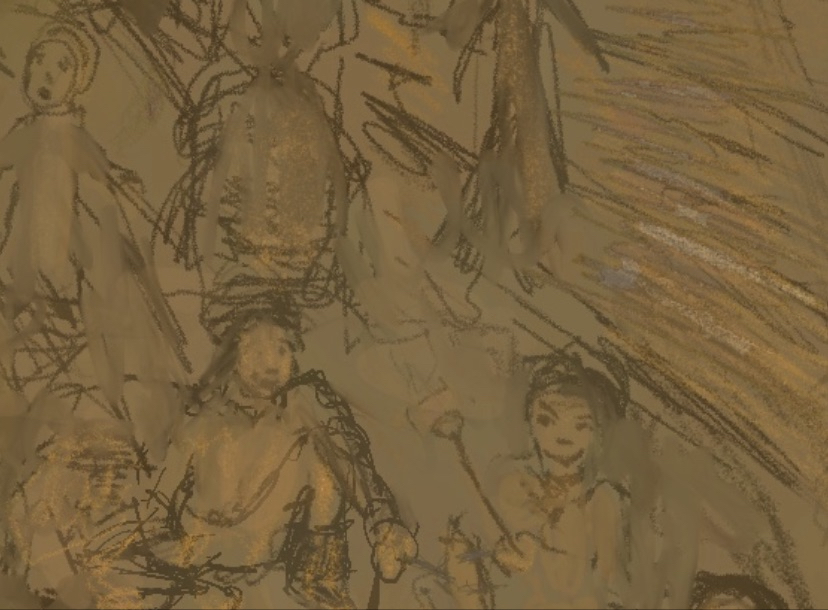
EXAMPLE DREAM MICE SONG, SHOULD BE DAFT AS:
Dream mice song
Solo,
If at bedtime you eat cheese,
All:
The Dream Mice say, “Yes please!
Yes please to the cheese
by our whiskers
Solo:
‘By our fleas!’
All:
We say yes please!
Yes Please!
Yes Please!
To the Cheese!
Director:
And now is the moment we’ve all been waiting for: let us all have a great big sniff of the cheese.
(All sniff, enraptured)
Solo:
By the Heavens I declare
All:
Delightful beyond compare!
And so thank you!
Thank you for the cheese!
Director (clap clap): Dream mice! Action!
They scatter.
